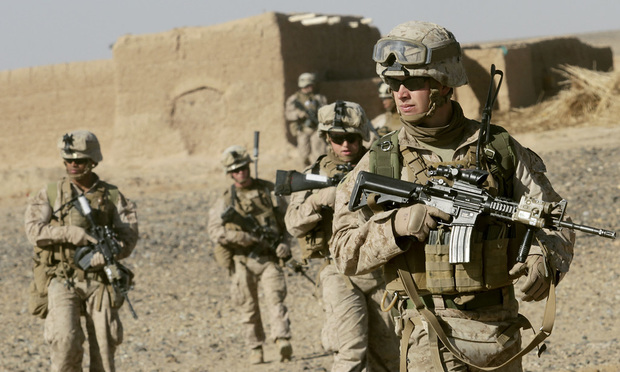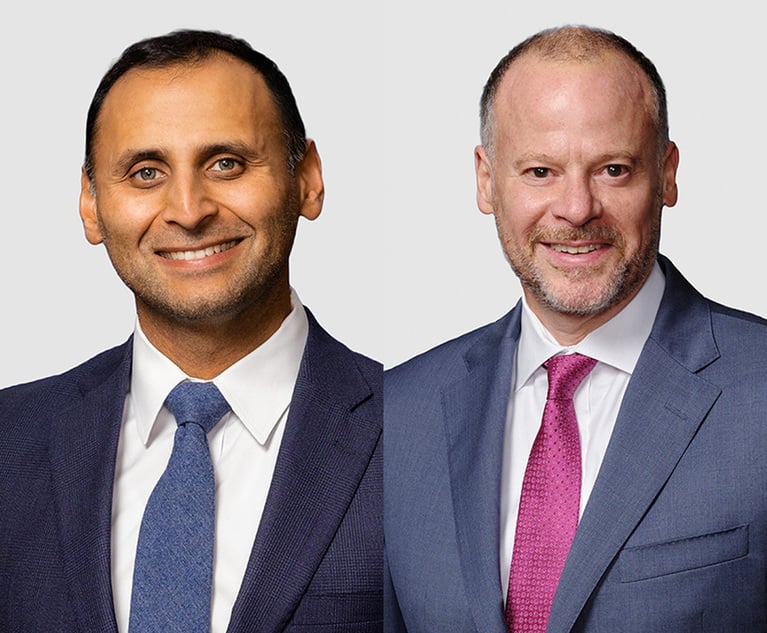Daily Dicta: Willkie, Kellogg Huber Put 8 Multinationals in the Crosshairs for Afghanistan Payouts
'Defendants paid the Taliban to leave them alone,"the complaint states. 'The payments saved defendants money: it was cheaper to buy off the Taliban than it would have been to invest in the security necessary to mitigate the terrorists' threats.'
January 07, 2020 at 01:18 AM
5 minute read
 U.S. Marine Sgt. Bryan Early, a squad leader with 1st Battalion, 9th Marine Regiment, leads his squad of Marines to the next compound while patrolling in Helmand province, Afghanistan, Dec. 19. Early is responsible for planning the squad's patrols, the safety of his Marines, and achieving his commander's intent, before, during, and after an operation. (U.S. Marine Corps photo by Cpl. Austin Long)
U.S. Marine Sgt. Bryan Early, a squad leader with 1st Battalion, 9th Marine Regiment, leads his squad of Marines to the next compound while patrolling in Helmand province, Afghanistan, Dec. 19. Early is responsible for planning the squad's patrols, the safety of his Marines, and achieving his commander's intent, before, during, and after an operation. (U.S. Marine Corps photo by Cpl. Austin Long)
Willkie Farr & Gallagher is best-known as a stalwart defense firm, not the type to dive into contingency fee representations.
But when Willkie partner Michael Gottlieb had the chance to team up with two of his undergrad debate team buddies from Northwestern to represent Americans who were severely injured in Afghanistan by terrorist attacks—or the family members of those who were killed—he jumped.
With the firm's blessing, Gottlieb plus Josh Branson, a partner at Kellogg, Hansen, Todd, Figel & Frederick, and Ryan Sparacino, a partner at Sparacino PLLC, filed two enormous lawsuits in late December in U.S. District Court for the District of Columbia.
"It's the opportunity to move the needle on an important legal issue … and to try to do something meaningful for Gold Star families," said Gottlieb, a former associate White House counsel under President Barack Obama who also previously served as the deputy director of an international civil-military task force devoted to rule of law and anti-corruption development in Afghanistan.
 One suit, which invokes the Foreign Sovereign Immunities Act, is against the Islamic Republic of Iran for allegedly providing material support to al-Qaeda, the Taliban, and other terrorists operating in Afghanistan and Pakistan. It's a safe bet that one will be decided by default judgment.
One suit, which invokes the Foreign Sovereign Immunities Act, is against the Islamic Republic of Iran for allegedly providing material support to al-Qaeda, the Taliban, and other terrorists operating in Afghanistan and Pakistan. It's a safe bet that one will be decided by default judgment.
But the other case, a multi-billion dollar claim against eight multinational corporations that have done business in Afghanistan, seems likely to spark a vigorous fight.
The defendants—certain parent companies and/or subsidiaries of Centerra Group, Environmental Chemical Corporation, G4S, DAI Global, Janus Global Operations, Black & Veatch Special Projects Corporation, the Louis Berger Group, and MTN Group—are being sued for violating the Anti-Terrorism Act by allegedly making "protection payments" to known terrorists so that their business interests in Afghanistan would be left alone.
The Anti-Terrorism Act provides a private right of action—and treble damages—for U.S. citizens who are injured as a result of acts of international terrorism. Recent amendments also created aiding and abetting and conspiracy liability under certain circumstances
But to date, such suits against corporate defendants have proven difficult to win.
For example, Cleary Gottlieb Steen & Hamilton partners Jonathan Blackman and Larry Friedman last year were named Litigator of the Week for defeating a pair of ATA cases against National Westminster Bank and Crédit Lyonnais.
The banks were sued by victims of terror attacks in Israel and the Palestinian Territories, who accused them of providing material support for the attacks by providing banking services to charities that allegedly funded Hamas.
And in late 2018, Covington & Burling's David Zionts, John Hall and Mark Gimbel prevailed on behalf of Deutsche Bank, which was accused of "helping Iran finance, orchestrate, and support terrorist attacks on U.S. peacekeeping forces in Iraq from 2004 to 2011."
The Covington team persuaded the U.S. Court of Appeals for the Seventh Circuit to uphold a decision by the lower court to dismiss the case with prejudice, finding that Deutsche Bank was too far removed from the wrongdoing to be held liable.
Another case—brought by Sparacino and Kellogg Hansen, but not Willkie—is pending against five major pharmaceutical and medical supply companies for allegedly paying bribes to win business from the terrorist-controlled Iraqi Ministry of Health. What's not clear (at least to me) is whether the alleged misconduct might more rightly belong under the umbrella of the Foreign Corrupt Practices Act.
But the case against the companies doing business in Afghanistan is a bit different. It includes particularly damning accusations that that the defendants made direct payments to terrorists.
After obtaining information from confidential witnesses and conducting what plaintiffs' counsel describes as "an extensive investigation, including thousands of hours working on the matter and analyzing hundreds of transactions in Afghanistan from 2001 through the present," they say that they uncovered evidence of the payments.
"[T]he Taliban systematically approached companies operating in its areas of influence and demanded a percentage of their revenues," states the 288-page complaint. "The Taliban motivated companies to make the payments by presenting them with a choice: either meet the Taliban's monetary demands and help fund its insurgency, or face the risk of future terrorist attack."
"Defendants agreed to the Taliban's demands," the complaint continues. "The details varied—some defendants worked on development projects, others provided private-security services, while another operated a cellular-telephone network—but each owned valuable business assets in areas vulnerable to Taliban attack. To protect those businesses and grow their profits, defendants paid the Taliban to leave them alone. The payments saved defendants money: it was cheaper to buy off the Taliban than it would have been to invest in the security necessary to mitigate the terrorists' threats."
The Taliban, in turn, allegedly used the funds to bankroll its lethal attacks against Americans in Afghanistan.
The case has been assigned to U.S. District Judge Emmet Sullivan. None of the defendants have entered appearances of counsel, and three of the biggest—G4S, MTN Group and Janus—did not respond to requests for comment.
This content has been archived. It is available through our partners, LexisNexis® and Bloomberg Law.
To view this content, please continue to their sites.
Not a Lexis Subscriber?
Subscribe Now
Not a Bloomberg Law Subscriber?
Subscribe Now
NOT FOR REPRINT
© 2025 ALM Global, LLC, All Rights Reserved. Request academic re-use from www.copyright.com. All other uses, submit a request to [email protected]. For more information visit Asset & Logo Licensing.
You Might Like
View All
Trying a Case for Abu Ghraib Detainees Two Decades After Abuse

Why Lewis Roca's Doug Tumminello Treks to Ukraine to Offer Material and Moral Support in Fight Against Russia

Litigators of the Week: In Largest MDL to Date, 3M Settles for $6B With Veterans Claiming Hearing Damage

Litigators of the Week: Willkie's $455M Win Against Iran for US Soldiers Hurt or Killed in Terrorism Attacks in Iraq
Law Firms Mentioned
Trending Stories
- 1'It's Not Going to Be Pretty': PayPal, Capital One Face Novel Class Actions Over 'Poaching' Commissions Owed Influencers
- 211th Circuit Rejects Trump's Emergency Request as DOJ Prepares to Release Special Counsel's Final Report
- 3Supreme Court Takes Up Challenge to ACA Task Force
- 4'Tragedy of Unspeakable Proportions:' Could Edison, DWP, Face Lawsuits Over LA Wildfires?
- 5Meta Pulls Plug on DEI Programs
Who Got The Work
Michael G. Bongiorno, Andrew Scott Dulberg and Elizabeth E. Driscoll from Wilmer Cutler Pickering Hale and Dorr have stepped in to represent Symbotic Inc., an A.I.-enabled technology platform that focuses on increasing supply chain efficiency, and other defendants in a pending shareholder derivative lawsuit. The case, filed Oct. 2 in Massachusetts District Court by the Brown Law Firm on behalf of Stephen Austen, accuses certain officers and directors of misleading investors in regard to Symbotic's potential for margin growth by failing to disclose that the company was not equipped to timely deploy its systems or manage expenses through project delays. The case, assigned to U.S. District Judge Nathaniel M. Gorton, is 1:24-cv-12522, Austen v. Cohen et al.
Who Got The Work
Edmund Polubinski and Marie Killmond of Davis Polk & Wardwell have entered appearances for data platform software development company MongoDB and other defendants in a pending shareholder derivative lawsuit. The action, filed Oct. 7 in New York Southern District Court by the Brown Law Firm, accuses the company's directors and/or officers of falsely expressing confidence in the company’s restructuring of its sales incentive plan and downplaying the severity of decreases in its upfront commitments. The case is 1:24-cv-07594, Roy v. Ittycheria et al.
Who Got The Work
Amy O. Bruchs and Kurt F. Ellison of Michael Best & Friedrich have entered appearances for Epic Systems Corp. in a pending employment discrimination lawsuit. The suit was filed Sept. 7 in Wisconsin Western District Court by Levine Eisberner LLC and Siri & Glimstad on behalf of a project manager who claims that he was wrongfully terminated after applying for a religious exemption to the defendant's COVID-19 vaccine mandate. The case, assigned to U.S. Magistrate Judge Anita Marie Boor, is 3:24-cv-00630, Secker, Nathan v. Epic Systems Corporation.
Who Got The Work
David X. Sullivan, Thomas J. Finn and Gregory A. Hall from McCarter & English have entered appearances for Sunrun Installation Services in a pending civil rights lawsuit. The complaint was filed Sept. 4 in Connecticut District Court by attorney Robert M. Berke on behalf of former employee George Edward Steins, who was arrested and charged with employing an unregistered home improvement salesperson. The complaint alleges that had Sunrun informed the Connecticut Department of Consumer Protection that the plaintiff's employment had ended in 2017 and that he no longer held Sunrun's home improvement contractor license, he would not have been hit with charges, which were dismissed in May 2024. The case, assigned to U.S. District Judge Jeffrey A. Meyer, is 3:24-cv-01423, Steins v. Sunrun, Inc. et al.
Who Got The Work
Greenberg Traurig shareholder Joshua L. Raskin has entered an appearance for boohoo.com UK Ltd. in a pending patent infringement lawsuit. The suit, filed Sept. 3 in Texas Eastern District Court by Rozier Hardt McDonough on behalf of Alto Dynamics, asserts five patents related to an online shopping platform. The case, assigned to U.S. District Judge Rodney Gilstrap, is 2:24-cv-00719, Alto Dynamics, LLC v. boohoo.com UK Limited.
Featured Firms
Law Offices of Gary Martin Hays & Associates, P.C.
(470) 294-1674
Law Offices of Mark E. Salomone
(857) 444-6468
Smith & Hassler
(713) 739-1250






